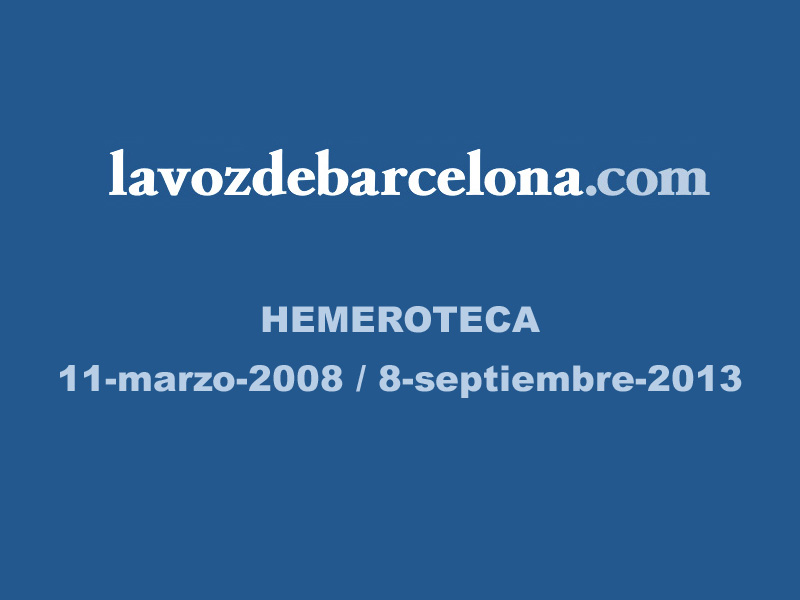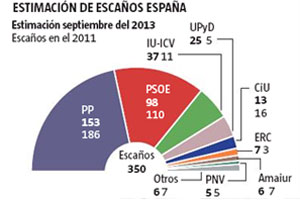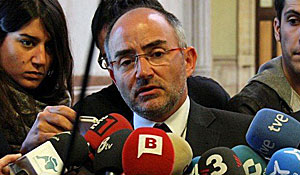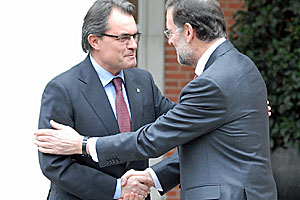RevistaWeb
“¿Por qué no tiene huevos Federico Jiménez Losantos para decir [que me echaron de la Cope por no hablar catalán]?”
[&hellip
Entrevista al consejero del CAC, Fernando Rodríguez Madero, publicada en eldebat.cat el 20 de noviembre de 2008:
Pregunta: Usted ha sido objetivo suyo, últimamente.
Rodríguez Madero: Yo le invito a que [Federico Jiménez Losantos] explique por qué me marché de la Cope, que dice que me echaron dos veces. La primera vez, me marché con Luis del Olmo para formar tándem, el director de la Cope de entonces, José Andrés Hernández, me pidió que me quedara. La segunda vez el argumento fundamental fue que yo no hablo catalán, una cuestión que está en los juzgados. ¿Por qué no tiene huevos Federico Jiménez Losantos para decir eso? No porque no lo sepa, no lo dice porque no tiene huevos.
Pregunta: ¿Cómo sucedió que precisamente la Cope le despidiera para no saber catalán?
Rodríguez Madero: En junio de 1997 Jorge Gracia, adjunto a la dirección general de la Cope, viene a verme a Barcelona para decirme que la Cope quiere que vuelva con ellos. Me ofrece hacer la programación de Cope Cataluña, que no tiene audiencia y está bajo mínimos. Yo estoy haciendo un programa nacional en Onda Cero, le digo que no. Al cabo de diez días, me llama Pedro Díez, director general de la Cope. Quiere que haga el programa de la tarde en la cadena. Le pongo como condición llevar mi equipo, Paco Vilariño, Alfonso Berruezo y Montse Rodríguez. Me dicen que eso es muy caro y le digo que o eso o no firmo. Aceptan y al cabo de tres meses la programación de Cope Barcelona es líder. Estamos en 1997, muere Antonio Herrero. Se monta un tinglado enorme, ponen una dirección general bicéfala con Pedro Díez y Rafael Pérez del Puerto. Llega junio y les digo, la temporada empieza en septiembre. Del programa nacional, parole, parole, no se hará porque es muy caro. “Queremos rescindir tu contrato”. Les digo que son unos canallas pero que muy bien. Si Cope me rescindía el contrato unilateralmente me tenían que pagar hasta junio del 2000. Me dicen que de acuerdo, pero que me pagarán sólo el 25% porque: “como tú no hablas catalán, te tenemos que pasar a la Onda Media y eso no es culpa nuestra, sino del gobierno”. La Cope me echó con la excusa de no hablar catalán, que lo diga Losantos si tiene huevos.







Por lo que dice, más que echarle por no hablar catalán, se escudaron en la legislación y en ese hecho para pagarle menos en su despido.
En fin, se han lucido en el PP escogiendo a un personaje con tantos rencores personales en un puesto decidiendo sobre el futuro de sus compañeros.
Está claro que PPC y PSC no son ninguna alternativa para los constitucionalistas o los que, simplemente, quieren políticos que solucionen problemas en vez de crearlos y no intervengan en los medios.
Por lo que he leído la decisión del CAC está plagada de ilegalidades y lo digo claramente. Ilegalidades, irregularidades, etc.
Esto lo tendrán que dirimir los tribunales y saber si hay damnificados para indemnizarles.
Ahora bien, el leñazo que le ha pegado indirectamente el señor Madero al Tripartit, es antológico. Esto sí que es un “Maderazo”
Para quien quiera ver ha quedado todo más claro que el agua del Noguera Pallaresa.
Por otra parte, tiene mucha suerte el Tripartit que se haya hecho pública la cacicada después de la publicación del The Economist.
Y este Madero de los huevos porque no lo denunció en su momento.
por qué se calló como un puta
Menelao: es nota que entens l’anglès. Si el llegires en l’original i no d’allò que et conten, veuries que el que s’hi parla del Principat (al The Economist) és poc i desafortunat. En palra de l’estructura autonòmica española…….compra’t, rei: un traductor, home de Déu!
A més de més d’un adjectiu impel·lit a Pujol.
Des de València amb molt d’amor:
Josep Blesa
How much is enough?
Nov 6th 2008
From The Economist print edition
Devolution has been good for Spain, but it may have gone too far
THE hardest problem for the authors of Spain’s democratic constitution was to strike a balance between the central government and the claims of Catalonia, the Basque country and Galicia for home rule. The formula they came up with was known as café para todos, or coffee for all: Spain was divided into 17 “autonomous communities” (plus the enclave cities of Ceuta and Melilla on the Moroccan coast), each with its own elected parliament and government. This estado de las autonomías seemed a neat solution. Over the past 30 years more and more powers and money have been devolved. The regional governments are now responsible for schools, universities, health, social services, culture, urban and rural development and, in some places, policing. But it is becoming clear that even as it has solved some problems, decentralisation has created others.
The estado de las autonomías has several clear benefits. First, as Mr Zapatero says, “it spreads power and impedes its concentration,” and in that way reflects “the best liberal thinking”. Second, by bringing decisions about services closer to the people it has improved them. Third, it encourages competition between regions. The rivalry between Barcelona and Madrid may have acquired an edge of mistrust, but it is in essence a creative tension. And fourth, the system has reduced regional inequalities, or at least stopped them widening.
To get a sense of the success of decentralisation, head not to Catalonia or the Basque country but to the south. In the 1970s Andalucía seemed much closer to Africa than Europe—and not just geographically. Rural labourers lived in semi-servitude and one adult in five was illiterate. Now it has narrowed the gap with the rest of Spain in many ways. The south is still poorer than the north, but Spain no longer has anything like Italy’s mezzogiorno.
In other parts of the country Valencia and Zaragoza have become thrusting cities with an economic and cultural life of their own, and Bilbao’s metamorphosis from a centre of declining heavy industry into a cultural and tourist magnet, started off by its Guggenheim Museum, has become a textbook case of urban regeneration.
All this has come at a political price. First, it has led to a renaissance of an old Spanish political phenomenon, the cacique or provincial political boss, as Antonio Muñoz Molina, a leading novelist, points out. Mr Pujol ran Catalonia for 23 years; Manuel Fraga, a former minister under Franco who founded the forerunner of the PP, ran Galicia for 15 years; and Manuel Chaves, a Socialist who has headed Andalucía’s regional government since 1990, is said to reign rather than govern.
These modern princes have their courts. “Every regional government wants its own universities, contemporary-art museum and science museum,” says Josep Ramoneda, who heads the Centre for Contemporary Culture in Barcelona. “In the United States there’s only one Hollywood. Here they want 17.” In Andalucía the regional government is by far the biggest employer, and the biggest advertiser in the regional press. Every regional government has its own television station. Mr Zapatero has taken to holding regular “presidents’ conferences” with his regional counterparts. The latest one attracted 600 journalists. “It looked like the UN General Assembly, with six or seven satellite trucks outside,” notes Enric Juliana, a journalist for La Vanguardia, a Barcelona newspaper.
The regional governments even get involved in foreign policy. Some have aid budgets. Mr Muñoz Molina, who was the director of the New York office of the Instituto Cervantes, a body to promote Spanish culture, recalls that regional presidents would turn up in the city with vast entourages. Most of these missions were badly organised and achieved nothing except favourable coverage in their captive media.
Coffee just for us
But this panoply of decentralisation has not placated the politicians in Catalonia, the Basque country and Galicia. That is because they never wanted café para todos: they wanted it just for themselves, as a recognition that they were different. They still want that, no matter that Spain is now an extraordinarily decentralised country in which the Basques, for example, enjoy a greater degree of home rule than any other region in Europe. Their demands make it difficult to draw up a stable and permanent set of rules.
Catalan and Basque “nationalists” argue that unlike, say, La Rioja or Murcía, their territories are nations, not regions (nor “nationalities”, in the tortuous formulation of the constitution), and invoke history to support their claim. “Here the conflict dates from 1836,” insists Joseba Aurrekoetxea, a leader of the Basque Nationalist Party (PNV), referring to the Carlist war after which the central government revoked the Basques’ fiscal privileges (restored in 1979). “Catalonia was always distinct,” says Artur Mas, who replaced Mr Pujol as leader of CiU. It descends from the medieval kingdom of Aragón, and rebelled against Madrid in 1640 and in 1701.
But Catalan and Basque nationalism are creations of the late 19th century. They stem from industrialisation, which made these the richest regions in the country, taking in migrants from elsewhere in Spain. At the time the Spanish state, unlike its French counterpart, lacked the resources to integrate the country, says Antonio Elorza, a Basque political scientist at Madrid’s Complutense University. Otherwise Catalonia and the Basque country would have been as content within Spain as Languedoc and Brittany are within France.
Perhaps because the historic claim to nationhood is shaky, language has become an obsession for the nationalists. Franco banned the public use of Catalan, Euskera (Basque) and Gallego. The constitution made these languages official ones alongside Spanish in their respective territories. In Catalonia the official policy of the Generalitat (the regional government), under both the nationalists (some of whom are really localists) and now the Socialists, is one of “bilingualism”. In practice this means that all primary and secondary schooling is conducted in Catalan, with Spanish taught as a foreign language. Catalan is also the language of regional government. A Spaniard who speaks no Catalan has almost no chance of teaching at a university in Barcelona. A play or film in Spanish will not be subsidised from public funds. “If we don’t make a big effort to preserve our own language, it risks disappearing,” says Mr Mas.
Catalan and Spanish are more or less mutually comprehensible. Not so Euskera, which does not belong to the Indo-European family of languages. The Basque government allows schools to choose between three alternative curriculums, one in Euskera, another in Spanish and the third half and half. But in practice only schools in poor immigrant areas now offer the Spanish curriculum. Despite these efforts, Basque and Catalan are far from universally spoken in their respective territories: only around half of Catalans habitually use Catalan and about 25% of Basques speak Euskera.
The nationalists’ linguistic dogmatism is provoking a backlash. Earlier this year Mr Savater, the philosopher, together with a diverse group of public figures ranging from Placido Domingo, a tenor, to Iker Casillas, Real Madrid’s goalkeeper, signed a “manifesto” in defence of the right of citizens to be educated in Spanish. They were denounced as “Castilian nationalists” in the Socialist press. But they touched a nerve. Many thoughtful Catalans believe that Catalan would be safe if it remained the language of primary schools, but that Catalonia would gain much by allowing a choice between Catalan and Spanish in secondary schools.
The power of language
The argument about language is really about power. “The problem with nationalists is that the more you give them, the more they want,” says Mr Savater. What some of them want is independence; all of them use this as a more or less explicit threat to gain more public money and powers. The polling evidence suggests that no more than a fifth of Catalans are remotely tempted by the idea of independence. The figure for Basques is around a quarter, despite 30 years of nationalist self-government and control of education and the media, and despite the departure of around 10% of the population because of ETA’s violence, points out Francisco Llera, a (Socialist) political scientist in Bilbao.
ETA’s political support is declining, though not vanishing. The PNV is split between a pro-independence wing led by Juan José Ibarretxe, the president of the regional government, and home-rulers in the party leadership. Mr Ibarretxe wants to hold a referendum on the right of Basques to self-determination. Mr Aurrekoetxea argues that ETA should not have a veto over whether Basques can peacefully express a view on the future.
The government, parliament and the courts have all blocked the referendum plan “because it is against the constitution”, says Mr Zapatero. “It would make ETA right in fighting on the basis that this is an oppressed people,” says José Antonio Pastor, a Basque Socialist. He and many other non-nationalist politicians and their families must live with round-the-clock bodyguards. In parts of the Basque country, in the tight rural valleys on the borders of Vizcaya and Guipúzcoa, non-nationalists cannot campaign freely. The Socialists hope to win a Basque regional election due in March. To improve their chances, they are following their Catalan peers in embracing cultural nationalism.
Buying off the Basque and Catalan nationalists with more money has become harder. The central government now accounts for just 18% of public spending; the regional governments spend 38%, the ayuntamientos (municipal councils) 13% and the social-security system the rest. But under the new Catalan autonomy statute more money has to be devolved. Over the next seven years Catalonia will have to be given a share of public investment equivalent to its weight in the Spanish economy, which will amount to an extra €5 billion a year. Previously Catalonia, although Spain’s fourth-richest region, received less public spending per head than several others. It complains that its commuter trains, in particular, have been starved of funds.
The Basques have no such worries: each Basque province and Navarre collect their own taxes and hand over less than 10% to the central government in Madrid. But they benefit from central-government defence spending, and they are net recipients from the social-security system. As a result, public spending per person in the Basque country is the highest in Spain.
The new Catalan statute requires the government to strike a new regional financing deal, even though the one in 2001 was supposed to be final. But it is to the central government that Spaniards will look for unemployment benefits and for spending to alleviate recession. Local governments are likely to suffer budget cuts by 2010, if not next year.
The government’s ability to carry out economic reforms is also compromised by decentralisation. As regional governments acquire more and more power to regulate, businesses face higher compliance costs. Now that the government employment service has been decentralised, José María Fidalgo, the general secretary of the Workers’ Commissions, the largest trade-union federation, worries that jobseekers have to look at 17 different websites.
It would have been easier for all concerned if Spain had adopted federalism in 1978. That would have set clear rules and aligned responsibilities for taxing and spending. The Senate could have become a place where the regions were formally represented and could settle their differences, akin to Germany’s Bundesrat. But the Catalan and Basque nationalists will only accept a confederation of several “nations”. The PP also opposes federalism.
In the meantime Spain must muddle on. “The great Spanish project is not in danger, but it’s like a plant that requires constant tending,” says Narcís Serra, who used to be Mr González’s vice-president and now runs Caixa Catalunya, a savings bank. “It’s important that Catalonia is comfortable in the project.” The government in Madrid could make some gestures to the regions, such as moving some regulatory agencies or other national bodies out of the capital. And would it really be the end of Spain if the Basques, like the Welsh, had their own national football team?
Elsewhere in the country anti-nationalism is starting to stir. Mr Savater and Rosa Díez, a former Basque Socialist leader, have set up a new party of the radical centre called Union, Progress and Democracy (UPyD), in an effort to combine social liberalism with a defence of the idea of Spain. They hope to profit from the rising disillusion with both the main parties. Even though it lacked money and access to the media, it won 1.2% of the vote in the March election, the same as the PNV. But because the electoral system disproportionately rewards geographically concentrated votes, the UPyD secured only one deputy, Ms Díez, against the PNV’s six. It hopes to do better in an election to the European Parliament next June, for which the whole country will count as a single constituency.
http://www.economist.com/specialrep....d=12501023
També qualifica a Chaves i a Fraga de cacics. I això és una aportació de Muñoz Molina, director de l’institut Cervantes durant molts anys. Els catalans també paguem l’institut Cervantes amb els nostres impostos i no ens queixem pas. Mai he vist que cap partit ni cap periodista català hagi dit res en contra. tampoc veig que el sr. Muñoz Molina faci fàstics als diners que els catalans invertim per a la continuïtat i aprenentatge de la llengua espanyola a l’estranger.
El pitjor de tot és que l’article no diu res de nou.
La veritat és que jo hagués evitat l’enrenou, que diguin el que vulguin, nosaltres hem de seguir lluitant pels nostres drets, ja sabem que el camí està ple d’obstacles.